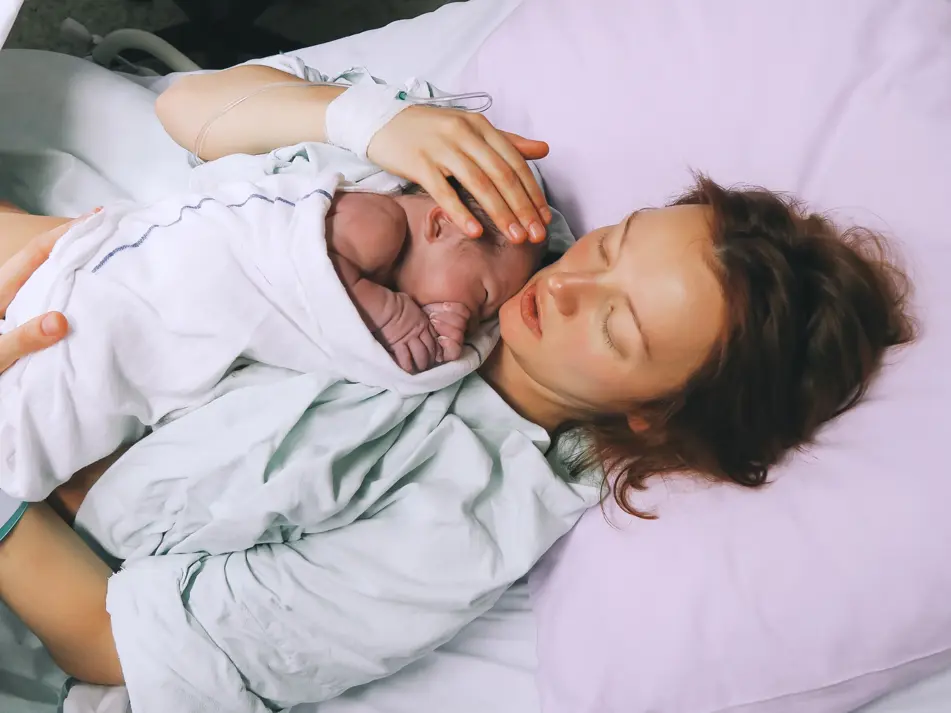Birth Trauma

On this page
What is birth trauma?
Birth trauma is distress experienced by a woman during or after giving birth. Trauma can be physical, emotional and/or psychological. On this page, we will be talking more about the psychological or emotional effects of birth trauma.
Many women find childbirth emotionally traumatic. It is not just about what happened during the labour and the birth. It can also be about how you feel after the birth. You might have felt afraid, or helpless, and that your views or wishes were not being heard. After the birth some women feel shocked, numb, anxious or angry about the experience.
If you experienced a physically traumatic birth, you might have been separated from your baby and not known if they were OK. You might not have been able to hold your baby immediately and experience skin to skin contact, which so many parents and babies crave after the birth.
Separation from your baby, lack of immediate contact with them and not knowing if they, or you, are physically healthy can lead to emotional trauma.
It may also lead to postnatal depression or anxiety.
What are some signs of birth trauma?
-
1
Having frequent unwanted and unpleasant thoughts about the birth.
-
2
Feeling like you are re-experiencing the stressful and difficult parts of the birth.
-
3
Experiencing physical symptoms like heart palpitations, sweating profusely, shaking, and butterflies in the stomach.
-
4
Having nightmares about the birth (or experiences that felt similar to the birth).
-
5
Becoming depressed.
-
6
Having no recollection of the birth.
-
7
Avoiding the baby.
-
8
Having difficulties bonding with your baby.
-
9
Feeling disoriented.
-
10
Feeling emotionally numb.
-
11
Being in a state of reduced consciousness. You’re awake but not aware or responding normally to the things going on around you.
For some people, these symptoms can be present for a short time after the birth and resolve without treatment.
However, if the symptoms persist for four weeks or more, or are very intense and distressing you should see your health professional to discuss treatment and referral options.
How can you heal from birth trauma?
Emotional trauma should be both assessed and treated by a qualified and experienced mental health professional. It can cause more harm to talk in detail about the experience with someone who is not trained to support you effectively.
Visit your GP and talk to them about how you are feeling, so they can develop a treatment plan with you. Tresillian provides support for parents who have experienced birth trauma and you can either be referred by a health professional, or you can self-refer.
How Tresillian can help
The Perinatal, Infant and Early Childhood mental health team includes psychologists, psychiatrists, social workers, psychiatrists in training, occupational therapists and clinical nurse consultants and provides multidisciplinary, wrap around support to meet your needs.
The team will assist you to manage your emotional health, and provide a safe reflective space to ensure a positive, secure relationship is developing between you and your infant.
Tresillian also offers groups to support your emotional wellbeing. Tresillian’s Vision is that ‘Every Child has the best possible start in life’ and we understand the profound effects of mental health on parental and child wellbeing and flourishing – ‘It’s in our nature to nurture.’
FAQs about birth trauma
There can be many reasons why one person perceives an experience as traumatic and another does not. There might be unpleasant experiences from your past, such as assault or abuse, that were stirred up during the birth. It might have led you to feel unsafe or not in control of what was happening to you.
If these feelings were combined with fear and pain, it is not surprising that you are now experiencing emotional distress. Your feelings and experiences are valid and cannot be explained away by someone else.
The most helpful thing for you now is to talk to someone who does understand your experience and can provide you with the support you need to recover.
Yes, they can. Emotional trauma is a response to any adverse event in which a person felt afraid, unsafe, helpless, and out of control (and more). As a brief response to an unpleasant event, it is normal to have these feelings.
When the symptoms become so frequent or intense and last for so long that they are affecting a person’s ability to work, sleep, interact with others and enjoy life, then treatment might be required to return to health and wellbeing.
Tresillian can provide free confidential mental health assessment and support for parents with infants and children 0 – 5 who access Tresillian services in metro Sydney, Canberra and regional sites across NSW and in northern Victoria.
When seeking Tresillian support, please feel confident to reach out to staff if there are feelings of distress or anxiety, or if it feels difficult to connect with your infant or child. Tresillian staff can provide one on one support via Day, Residential and Virtual services, but also Tresillian has a team of committed mental health practitioners to provide specialist support if needed.











































